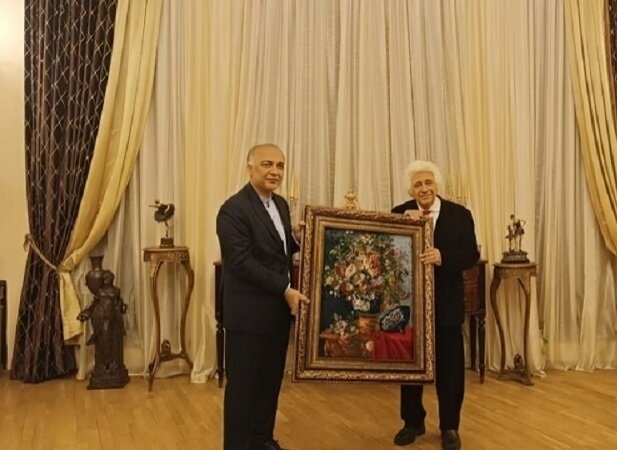Iranian ambassador in Armenia honors Tjeknavorian for staging “Rostam and Sohrab” opera in Yerevan

TEHRAN-The Ambassador of the Islamic Republic of Iran to Armenia, Mehdi Sobhani, expressed his appreciation to the renowned Iranian-Armenian musician and conductor Loris Tjeknavorian for the successful performance of the “Rostam and Sohrab” opera in Yerevan.
The opera, based on the stories of Shahnameh by the renowned Iranian poet Ferdowsi and composed by Tjeknavorian, was performed at the Armenian National Academic Theatre of Opera and Ballet in Yerevan in the presence of Armenian and Iranian officials, cultural and artistic figures, and enthusiasts, Honaronline reported.
The gala concert was first staged on March 22 and a week later, it was performed for three nights, from March 31 to April 2.
In his speech, Sobhani described the performance of “Rostam and Sohrab” in Yerevan as a historic event in Iran-Armenia cultural relations and expressed his gratitude to Tjeknavorian for his lifelong distinguished contributions to culture and the arts.
The Iranian ambassador described Tjeknavorian as a cultural bridge between Iran and other countries and nations worldwide.
The opera was staged for the audience through a joint collaboration between the Armenian National Opera and the Embassy of Iran in Yerevan.
The premiere of Tjeknavorian’s two-act opera “Rostam and Sohrab” was attended by the Minister of Education, Science, Culture, and Sports of the Republic of Armenia, Zhanna Andreasyan, along with deputy ministers Daniel Danielyan and Artur Martirosyan.
The minister also met with maestro Loris Tjeknavorian and the artists of the performance to congratulate them on the premiere.
Speaking about his work, Tjeknavorian said: “I have been in love with the story of Rostam and Sohrab since childhood. I have always wanted to write an opera, but I lacked the strength. I graduated from the Vienna Academy, returned to Persia, and began the project in 1961. The idea originated 65 years ago, and it is being staged now, 65 years later”.
“I wrote eight versions. When I started writing in Persian, I felt the need to present it to a great master. At that time, I considered going to Strasbourg to meet the renowned composer Carl Orff. When I met him, he listened to several excerpts from the opera and suggested that I stay in Strasbourg to finish it. I was a student, so I couldn’t stay, but he told me that the expenses for a year in Strasbourg had been covered. He said, ‘Go, sit and write the opera.’ It’s amazing, isn’t it?” he added.
“It was a challenging opera. I have performed the concert version several times in Vienna, England, Mexico, and Armenia, but it has never been staged. I am happy that it is being performed now,” he noted.
Tjeknavorian has used the folklore and traditional music of Iran in the opera. “I have been very fond of the stories of Iranian poet Abolqassem Ferdowsi's Shahnameh since my childhood. Shahnameh is not merely a book; it is the national history of Iran, and all the people of Iran know the Rostam and Sohrab legend”.
He believes Ferdowsi (940-1020) is the greatest poet of the world and that whatever is found in the works of William Shakespeare (1564-1616) exists in Ferdowsi's works too.
Born in Borujerd, Lorestan Province, Loris Tjeknavorian, 87, is one of the most celebrated cultural figures in Armenia and Iran. As one of the leading conductors of his generation, he has led international orchestras throughout the world and has been awarded numerous times in different music events.
As a composer, Tjeknavorian has written six operas, five symphonies, choral works, chamber music, ballet music, piano and vocal works, concerti for piano, violin, guitar, cello, and pipa (Chinese lute), as well as music for documentary and feature films.
His compositions have been performed by major orchestras, including London Symphony Orchestra, London Philharmonic Orchestra, Halle Orchestra, Philharmonic Orchestra Helsinki, American Symphony Orchestra in New York, Tehran Symphony Orchestra, Johannesburg Symphony Orchestra, Haifa Symphony Orchestra, the Mexico Symphony Orchestra, London Percussion Virtuosi, Strasbourg Percussion Ensemble, and English Chamber Orchestra.
From 2009 to the present, Tjeknavorian has continued to devote his time to composing, as well as painting and writing short stories. Among his most recent works are the operas “Zahak” (libretto based on Ferdowsi’s Shahnameh) and “Mowlana and Shams-e Tabriz” (libretto based on the poetry of Rumi), as well as the chamber opera “The Final Hour of Sadegh Hedayat” (libretto based on “The Blind Owl” and other works by the Iranian poet Sadegh Hedayat).
Other works include his second concerto for violin and chamber orchestra, a work for solo piano titled “1915,” and two major symphonic suites: “King Cyrus,” about the ancient Persian king, and “Takhti,” dedicated to the celebrated Iranian wrestler.
Photo: Loris Tjeknavorian (R) and Mehdi Sobhani
SS/
